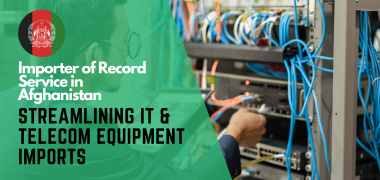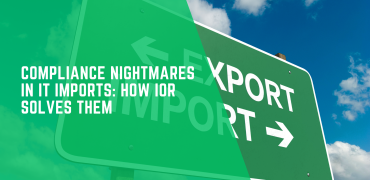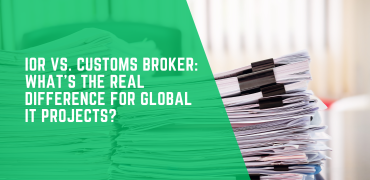Understanding the Importer of Record (IOR) Services
When importing goods into Afghanistan, the Importer of Record (IOR) service plays a crucial role in ensuring compliance with local regulations, managing duties and taxes, and facilitating a smooth import process. An IOR is responsible for all legal and financial aspects of the importation, including documentation, customs clearance, and tax payments. This service is especially beneficial for IT and Telecom companies that require specialized knowledge to navigate Afghanistan’s customs landscape.
Duties and Taxes on IT & Telecom Equipment in Afghanistan
Afghanistan’s duty and tax rates for importing IT and telecom equipment can vary depending on several factors, including the type of equipment, its classification under the customs tariff schedule, its country of origin, and changes in governmental policy. Here’s a general overview:
Customs Duty: This is a percentage of the goods’ declared value at the point of import. The rate typically varies from 8% to 18%, depending on the type of equipment and its classification. IT and telecom equipment often attract lower duty rates, but specific rates should be checked with Afghan Customs or through the Harmonized System (HS) codes.
Value-Added Tax (VAT): Currently, there is no VAT applicable for IT goods import into Afghanistan.
Additional Taxes: There is additional 2 % Fixed Tax, 2 % Red Crescent Tax, 4 % Business Reciept Tax (BRT) and 0.40 % of Municipality tax. In other words, there will be total 8 % miscellaneous taxes in addition to municipality tax.
Other Charges: Depending on the nature of the import, additional charges or fees might apply for ASYCUDA system fee, storage and or penalities.
Import Regulation and Requirements In Afghanistan
Importing IT and Telecom equipment into Afghanistan involves several regulations, permits, and certificates. Here’s a comprehensive overview of what you need to know about the import regulations in Afghanistan for IT and Telecom equipment:
1. Customs Clearance
Customs clearance is mandatory for all imports into Afghanistan. Importers must ensure that all required documents are prepared and submitted to the Afghan Customs Department for proper clearance. These documents typically include:
Commercial Invoice: A detailed list of the goods being imported, including quantities, prices, and other relevant information.
Packing List: A list of the contents of the shipment, indicating how goods are packed.
Bill of Lading/Airway Bill: The transportation document indicating the shipping details.
Certificate of Origin: This document certifies the origin of the goods being imported.
Export Declaration: Export GD from the origin Customs is required by the Afghan customs authorities to match the goods specification with the shiping documents presented.
2. Import Licenses and Permits
Certain types of IT and Telecom equipment may require specific import licenses or permits. These are generally issued by the Ministry of Communications and Information Technology (MCIT) or other relevant governmental bodies. Common permits and licenses include:
Import License: This is a general license allowing a business to import goods into Afghanistan. You may need this license to engage in importation activities for which our company can prescribed as IOR party for it.
Technical Certificates: Some IT and Telecom equipment may require technical certificates demonstrating compliance with national or international standards. For example, telecommunication equipment might need certification from the Afghanistan Telecom Regulatory Authority (ATRA).
Radio Frequency Authorization: If you’re importing equipment that uses radio frequencies, such as communication devices, you may need authorization from ATRA and Frequency Department at Ministry of Communications to ensure compliance with Afghanistan’s spectrum regulations.
How ASL Can Help with a Hustle-Free Import Process
ASL is one of the lading provider of Importer of Record (IOR) services in Afghanistan. ASL offers a comprehensive suite of services to ensure a seamless import process for IT and Telecom companies. Here’s how ASL can help:
Regulatory Compliance: ASL ensures all imports comply with Afghanistan’s customs regulations, reducing the risk of delays or penalties due to non-compliance.
Customs Clearance: With extensive experience in customs procedures, ASL can expedite the clearance process, ensuring timely delivery of your equipment.
Document Management: ASL handles all necessary documentation, including import licenses, permits, and certificates, saving you the hassle of navigating bureaucratic processes.
Duty and Tax Payment: ASL calculates and pays all applicable duties and taxes on your behalf, ensuring accurate and timely payments.
Expert Guidance: ASL’s team of experts provides advice on import regulations, tariffs, and customs requirements, helping you make informed decisions.
By partnering with ASL, IT and Telecom companies can focus on their core business operations while ASL takes care of the complexities of importing equipment into Afghanistan. This not only reduces stress but also ensures a more efficient and cost-effective import process. For inquiries contact ASL IOR Specialist now.




